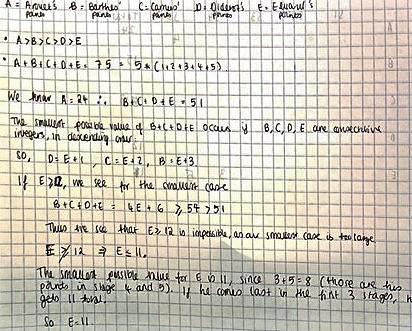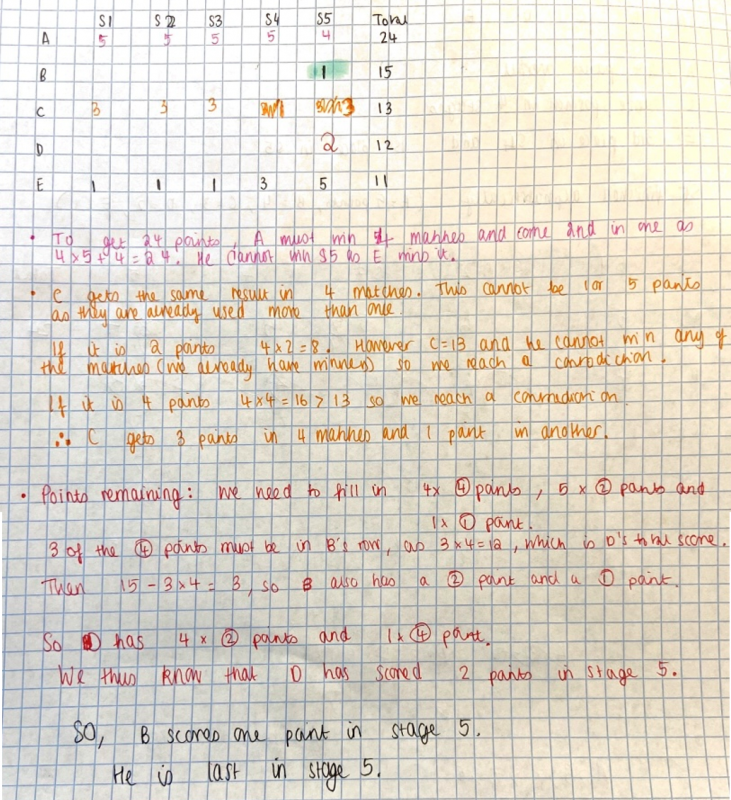The Tour De Clochemerle
Can you work out where these 5 riders came in a not-quite-so-famous bike race?
Problem
The Tour de Clochemerle is not yet as big as the rival Tour de France.
This year there were five riders, Arouet, Barthes, Camus, Diderot and Eluard, who took part in five stages. The winner of each stage got 5 points, the runner up 4 points and so on down to the last rider who got 1 point. The total number of points acquired over the five stages was the rider's score. Each rider obtained a different score overall and the riders finished the whole tour in alphabetical order with Arouet gaining a magnificent 24 points. Camus showed consistency by gaining the same position in four of the five stages and Eluard's rather dismal performance was relieved by a third place in the fourth stage and first place in the final stage.
Explain why Eluard must have received 11 points in all and find the scores obtained by Barthes, Camus and Diderot.
Where did Barthes come in the final stage?
Clochemerle is a French satirical novel by Gabriel Chevallier (1895–1969) first published in 1934. It centres on personal rivalries and local politics in the fictional village of Clochemerle and concerns a dispute over the construction of a vespasienne (public urinals) near the village church. The term Clochemerle has entered French as a term to describe "petty, parochial squabbling".
STEP Mathematics II, 1995, Q3. Question reproduced by kind permission of Cambridge Assessment Group Archives. The question remains Copyright University of Cambridge Local Examinations Syndicate ("UCLES"), All rights reserved.
Getting Started
It might help to draw a table to show the riders, and their scores at each stage of the race.
| A | B | C | D | E | |
| Stage 1 | |||||
| Stage 2 | |||||
| Stage 3 | |||||
| Stage 4 | |||||
| Stage 5 | |||||
| Total score |
You can then use the information given in the question to start to fill in some of the cells of the table.
It might also help to work out the total score of all five riders.
There is a lot of information in the question, so be prepared to go back and read it again to see if you have missed anything, or if there is some piece of information that you couldn't use initially which you can use later on.
Student Solutions
Nikita from Jersey College for Girls in Jersey, Yihuan from Pate's Grammar School, Maria from NSG, Vivek from Wilson's School and Will from Dover Girls Grammar School all in the UK all explained why Eluard must have got 11 points. Maria made some assumptions from the language in the question:
Eulard performed dismally in the first 3 stages, suggesting he got last place. Then he got 3rd place in the penultimate stage and 1st in the final stage: 1+1+1+3+5=11 points overall.
Nikita, Yihuan, Vivek and Will used the total number of points to show that Eluard must have got 11 points. This is Nikita's work:

Vivek and Nikita worked out how many points Barthes, Camus, Diderot got using the same idea. Vivek wrote:
The other cyclists in place 2, 3 and 4 have to get a different number of points that are:
- above 11
- below 24
- add up to the remaining 40 points
The only set of integers that can satisfy these statements are 12, 13 and 15.
Nikita showed how to work what happened in the last race (click on the image to see a larger version):

Will and Yihuan used the information about Camus's score to work out how the races went. This is Will's work:
Teachers' Resources
This question requires students to read the given information carefully, work out what they can deduce initially, and then make further deductions, until they have solved the problem.
Some questions to help students might include:
- Can you work out where Arouet came in each of the five stages?
- What is the total number of points earned by the five riders at the end of each stage?
- What is the total number of points earned by all five riders over the five stages?
- Can Eluard have gained less than 11 points? Can he have gained more than 11 points?
It might be helpful to encourage students to draw a table (like the one in Getting Started) to help them organise their deductions.
